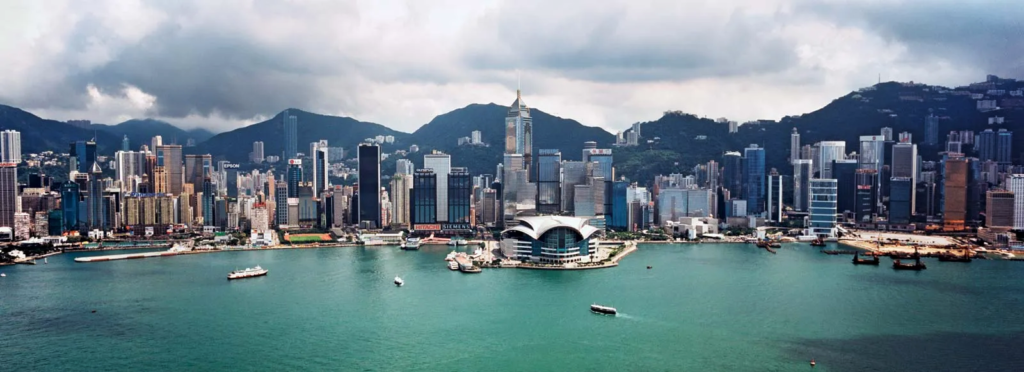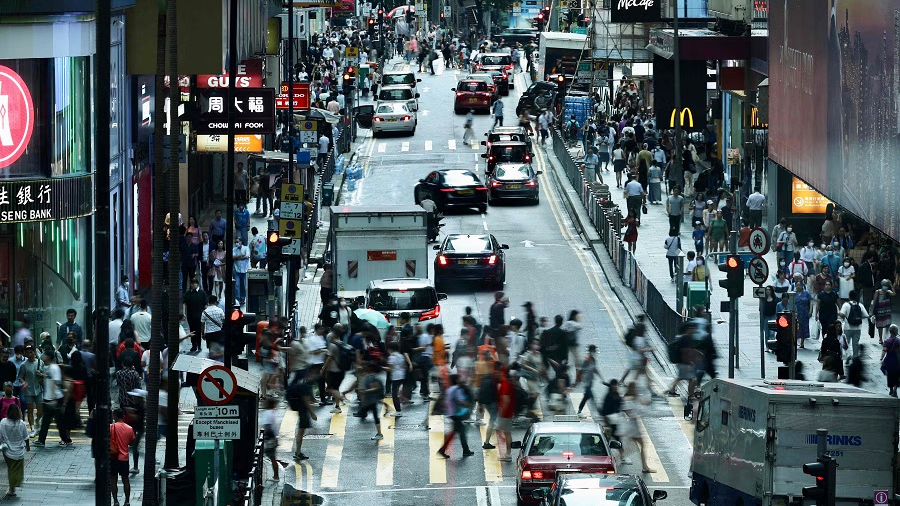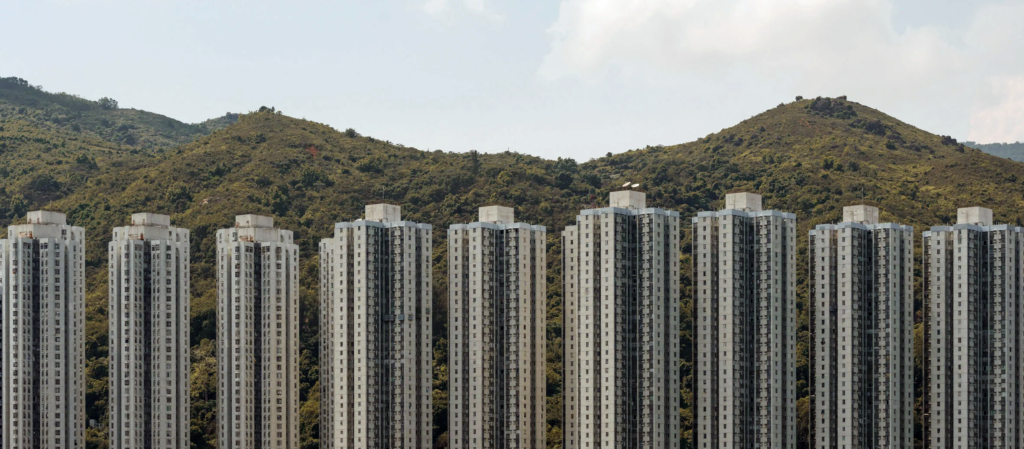Relocate to Hong Kong as an expat in 2024
Thinking of becoming an expat and starting a new chapter in a foreign country? Hong Kong is one of the most expat-friendly cities in the world, boasting a high-income economy, developed infrastructure, excellent quality of life, and an ultra-low crime rate. In this article, we’ll navigate the intricacies of moving to Hong Kong in 2024, covering everything from financial perks to socio-political realities. Whether you’re a seasoned professional or an intrepid adventurer, you’ll find the insights and advice you need to thrive in the dynamic landscape of Hong Kong expat life. Let’s get started.

Low tax, high income
Let’s talk about one of the biggest reasons to consider Hong Kong as your expat destination: its financial perks.
Hong Kong’s income tax rates are significantly lower than most other developed countries. At most, you’ll only pay 15% in taxes, which is much lower than places like the UK. Plus, there are plenty of tax breaks and lower tax brackets to help you save even more.
Let’s break it down with an example. Say you earn £60,000 a year in the UK. According to HMRC, you’d pay about £15,393 in taxes, leaving you with £44,607 in take-home pay.
Now, let’s convert that salary to Hong Kong dollars. £60,000 GBP is roughly HK$591,583. Using Hong Kong Inland Revenue Department’s tax calculator, you’d only owe about $57,069 in taxes per year. That means your take-home pay in Hong Kong would be around HK$534,514.
In Hong Kong, that same salary would leave you with HK$516,514, or roughly £52,390.45. That’s £10,783.45 more than what you’d have left over in the UK. In other words, you’d be 26% better off in terms of salary.
| United Kingdom | Hong Kong | |
| Before tax annual salary | £60,000 | HK$591,583 |
| Take home | £44,607 | HK$534,514 |
| Pension/MPF | £3,000 | HK$18,000 |
| Disposable Income | £41,607 | HK$516,514 |
| Disposable Income % | 69.3% | 87.3% |
Consider another scenario: suppose you’re an Australian earning A$85,000 in Sydney. Your estimated tax burden would amount to A$18,092. Now, let’s compare that to Hong Kong. With the same salary, roughly HK$433,414, your total tax bill would be HK$48,180. That’s nearly half the tax burden you’d face in Australia.
| Australia | Hong Kong | |
| Before tax annual salary | A$85,000 | HK$433,414 |
| Take home | A$66,908 | HK$385,234 |
| Pension/MPF | A$10,200 | HK$18,000 |
| Disposable Income | A$56,708 | HK$367,234 |
| Disposable Income % | 66.7% | 84.7% |
The actual salary you’ll receive depends on a range of factors, including your industry, profession, experience level, and more. Based on my anecdotal experience, salaries in Hong Kong often match those in the UK or Australia. As an expat with global experience, you possess a unique competitive edge, potentially leading to even higher earnings. While junior salaries may be lower initially in Hong Kong, as your career advances, you can unlock exponentially higher earning potential.
What about the cost of living?
Hong Kong also boasts a more affordable lifestyle compared to cities like London and Sydney. According to Numbeo’s data, consumer prices, including rent, are 12.6% lower in Hong Kong than in London, and 1.4% lower than in Sydney. Additionally, the local purchasing power in Hong Kong surpasses both London and Sydney, with figures showing a 18.0% higher purchasing power compared to London, and 8.9% higher compared to Sydney.
Based on my personal experience living in both Hong Kong and London, you’ll generally find things cheaper in Hong Kong. Dining out, public transport, and shopping all come at a lower cost. Rent per square foot is comparable between the two cities, though Hong Kong flats tend to be smaller. Utilities like electricity, gas, and water are significantly cheaper in Hong Kong, and broadband is not only more affordable but also much faster. The one exception might be groceries, which are often pricier in Hong Kong due to the need to import food from around the world.
Every individual’s circumstances are unique, and while this data offers a broad overview of income and expenses in Hong Kong, it may not perfectly reflect your specific situation. However, drawing from both this data and my personal experience residing in both Hong Kong and London, I’m quite confident that securing a decent job in Hong Kong would likely leave you with more disposable income.
Hong Kong’s lifestyle
Living in a foreign country involves more than just money—it’s about your well-being too. Having experienced both Hong Kong and London firsthand and conversed with friends in both cities, I can attest to the distinct lifestyle vibes each offers. Whether you’ll love it or not depends on your personal taste. So, let’s dissect life in Hong Kong into three key areas to give you a clearer picture.
Hong Kong is always in rush

Some call it efficiency, some call it stress. Efficiency reigns supreme here. Public transport is fast, convenient, reliable, and won’t break the bank. Local eateries like Cha Chaan Teng serve up affordable and hearty meals at lightning speed. Hong Kongers aren’t fans of slowing down; dawdle on a Tuesday afternoon and expect some impatient noises urging you to pick up the pace. And for goodness’ sake, have your payment card ready at the MTR gates—nothing worse than a wallet hunt at the gate!
If you thrive on the fast lane, Hong Kong is your playground. Even banks and government offices operate at lightning speed compared to most places. But if the hustle sounds more like stress to you, if you’re craving a more laid-back vibe, maybe look elsewhere.
Hong Kong is a cultural melting pot
Hong Kong, a city steeped in Chinese roots with a dash of British colonial influence, is the epitome of cultural fusion—where East seamlessly blends with West. In the bustling commercial hubs, you’ll find familiar international chains and a high-quality Western lifestyle. But for the adventurous souls, there’s a treasure trove of traditional Chinese and Asian culture waiting to be explored.
Cultural shock isn’t a common occurrence here; people generally keep to themselves. While Hong Kongers may not always be the warmest bunch, they’re accustomed to mingling with folks from all corners of the globe. The younger generation, in particular, boasts varying levels of English proficiency, making communication a breeze. That said, making an effort to pick up Cantonese and embrace local traditions won’t go unnoticed—it’s the best way to truly connect with the locals.
People, people everywhere

Hong Kong stands as one of the most densely populated places globally, with a compact urban area, home of 7.5 million. Here, towering skyscrapers dominate the skyline, and it’s not uncommon to call the 40th floor home in an apartment complex. With such density comes a scarcity of public spaces, narrow streets, and smaller living quarters—space is a luxury everyone craves but few possess. This density is precisely what makes the city so remarkably convenient. Yet, if wide-open skies and ample personal space are your cup of tea, Hong Kong might not be your dream destination.
I trust the insights above paint a clearer picture of what life in Hong Kong could entail for you. Of course, there’s more to consider. The muggy, humid summers and frequent rainfall might pose a challenge for some. Additionally, air quality and pollution levels can be higher than what many are accustomed to in Western cities. But amidst these challenges, there are also other perks. Hong Kong’s strategic location offers easy access to numerous Asian destinations, including Japan, Korea, Taiwan, Thailand, Malaysia, and China. Moreover, Hong Kong itself boasts surprisingly accessible countryside areas, where hiking, beach outings, and water sports are popular pastimes.
Political Risk in the 2024 Hong Kong

If you aren’t living under a rock, you’re probably aware of the major pro-democracy protests in Hong Kong in 2019. In response to this unrest, China introduced the infamous National Security Law in 2020, a draconian measure that severely curtailed the political freedoms Hong Kong had long enjoyed as an autonomous (semi) city-state. Under this new NSL and the recent Article 23, certain political activities are criminalized, and those convicted may be sent to mainland China for closed-door trials, facing penalties as severe as life imprisonment.
Before considering a move to Hong Kong, it’s crucial to grasp the political risks and instability inherent in the region.
Let’s begin with what Hong Kong is, and its relationship with China.
Hong Kong is a special administrative region of the People’s Republic of China, its high degree of autonomy stems from its colonial past. Following its handover to China on July 1, 1997, Hong Kong operated under the “one country, two systems” framework, maintaining significant autonomy while still being part of China.
However, tensions between Hong Kong and Beijing have escalated over the years, fueled by the desire for greater democracy. The watershed moment came with the 2019 protests, where millions took to the streets in defiance. What began as peaceful demonstrations evolved into widespread civil unrest, with significant clashes and political upheaval.
The COVID-19 pandemic temporarily quelled the protests, but Beijing’s response was swift and severe. Key pro-democracy figures were arrested, draconian national security laws were enacted, and dissenting voices were silenced. This crackdown has led to a sharp decline in freedom and autonomy, prompting concerns among foreign companies and multinational corporations.
In 2024, living in Hong Kong comes with heightened political risks. The local government, now fully aligned with Beijing, prioritizes “political stability” over economic prosperity. Led by John Lee, a former police officer and Secretary of Security, the government’s approach reflects its authoritarian leanings.
While it’s important to grasp the significant changes Hong Kong has undergone and recognize that it isn’t exactly a bastion of freedom in 2024, foreigners who avoid publicly criticizing the government and steer clear of political trouble generally find living in Hong Kong to be safe.
How to move to Hong Kong
If moving to Hong Kong still tempts you after weighing its pros and cons, let’s talk about the how.
There are multiple visa schemes that can allow you to work and start a life in Hong Kong.
- If you graduate from one of Hong Kong’s universities, you may be eligible for the IANG (“Immigration Arrangements for Non-local Graduates”) scheme.
- GEP (General Employment Policy) is the standard work visa, which requires an employer to apply on your behalf.
- Don’t have a job offer yet? If you graduate from a prestigious university or possess highly sought-after skills and proven professional experience, the TTPS (Top Talent Pass Scheme) and QMAS (Quality Migrant Admission Scheme) might offer you a pathway to begin your expat life in Hong Kong.
Have a look at the Immigration Department’s official website to check the latest requirements for these visa schemes.
Is Hong Kong for me?
Hong Kong is quite a unique place on earth. It’s extremely dense, but thanks to that density, it’s extremely convenient. It’s extremely efficient, yet this very efficiency can be extremely stressful for some. It’s a fantastic place for making money, and it boasts a culture that encourages spending it.
What you may like about Hong Kong
Hong Kong offers much excitement for young adults. Contrary to popular belief, it is hardly an urban jungle. Over 70% of Hong Kong’s land is reserved for country parks and wilderness. Hiking trails are well-maintained and easily accessible by public transport. Surrounded by ocean and outlying islands, there are many natural beaches and coasts perfect for various watersports. You can even find a UNESCO geological heritage site in Hong Kong.
Hong Kong is also a great hub for exploring East and Southeast Asia. Centrally located among many exciting destinations, cities like Tokyo, Bangkok, and Bali are all just 2-4 hours away. The city is famous for its vibrant nightlife, with Lan Kwai Fong, Peel Street, Wan Chai, and Tsim Sha Tsui hosting many quirky and characteristic bars, pubs, and restaurants for all tastes.
If you are ambitious, you can easily find like-minded people in Hong Kong. While it is notorious for long working hours and high stress, Hong Kong’s working culture also rewards productive and skilled professionals with high earning potential and rapid promotion opportunities. Hong Kongers generally believe in ‘work more, earn more.’ Many people are willing to sacrifice some of their work-life balance for a faster track to career advancement. Compared to most places in the world, Hong Kong’s salary curve is much more skewed. The starting salary may seem low, but it rises rapidly. Combined with the low income tax, it’s not uncommon to make a six-figure salary before your 30s if you work really hard and excel at what you do.
What you may not like about Hong Kong
Hong Kong is not family-friendly. From the description above, you probably get the gist. It is a relatively small urban area housing over 7 million people. Flats are small, streets are narrow, parks are scarce, and driving is discouraged (and expensive). Although there are excellent international schools, Hong Kong is generally not a parent-friendly place. Public transport is not built for families; for example, strollers or prams need to be folded to enter buses. Family changing rooms are also scarce in public places.
It’s also not a pet-friendly place. Most landlords and private residential buildings impose strict restrictions on pets, especially dogs. Dogs are only welcome in a few designated dog parks or seafront promenades. Many people, especially the older generation, don’t really like dogs. Additionally, dogs are not allowed on public transport, and you need to pay extra if you take your four-legged friend with you in taxis.
In terms of weather, it really comes down to personal preference. In my opinion, Hong Kong has a wonderfully mild winter from December to February, with daytime temperatures hovering around 10-20°C and relatively dry, clear conditions. However, Hong Kong’s summer can be unbearably hot, humid, and rainy. It’s also typhoon season, with frequent tropical rainstorms.
Hong Kong vs Singapore
It’s a common comparison, so this guide wouldn’t feel complete without addressing it. Let me spoil it: in 2024, Singapore is probably better for most people. It’s like the younger, cooler, more successful, more cheerful sibling, while Hong Kong is the older, grumpy, wilting sibling that is still somehow living in its past. And this perspective comes from a Hong Konger.
I don’t want to be overly negative about my hometown, but let’s face it, Singapore is just better now. In 2022, SG’s GDP per capita reached 82,807 USD, one of the highest in the world, while Hong Kong’s figure of 48,983.62 is not bad, but obviously far behind Singapore. Singapore simply offers more opportunities, is more attractive to global businesses and talents, and has overtaken Hong Kong to be Asia’s most prominent world city.
Let’s dive into the pros and cons of Hong Kong compared to Singapore. Again, this is solely based on my personal opinion and anecdotal observations, so take it with a grain of salt.
Reasons to Choose Singapore over Hong Kong:
- More opportunities overall.
- Cleaner, safer, better governed, and more orderly – possibly the best in the world in that regard.
- Very child-friendly and pet-friendly.
- More diverse, international, and English-speaking. Although English is also the official language of Hong Kong, not every local Hong Konger speaks English fluently. While English is the first language for most Singaporeans.
- Hong Kong’s political uncertainty. Since the “crackdown”, Hong Kong is losing its unique character and becoming yet another Chinese city. The current unique status may not last, and no one knows what would happen next.
- More and more high paying roles in Hong Kong require Mandarin speaking.
Reasons to Choose Hong Kong over Singapore:
- Nature, beaches, and four seasons – Singapore is just summer all year round.
- More unique character and culture.
- Potential for faster career advancement.
- Ironically, housing may be cheaper than Singapore now. Despite its reputation for unaffordable housing, rent has stabilized in Hong Kong. Rental costs are influenced by various factors, but there’s a general sentiment that rent is rising in Singapore and falling in Hong Kong due to relative economic performance.
- Easy access to permanent residency – living in Hong Kong legally for 7 years in a row on a work visa grants you PR status.
- Work visas are easier to obtain compared to Singapore. Let’s face it, most people want to go to Singapore now, creating a simple supply and demand scenario.
